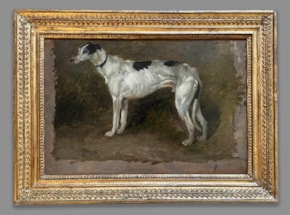Thomas Sidney Cooper ( 1803 - 1902 )
Study of a Lurcher
Provenance:
Probably the artist’s posthumous sale, Christie’s, 12th-15th April 1902, within lots 431-448 as ‘Studies in oil – In the folio’;
with W.S. Fine Art, London, by 2006;
Barbara & Ernest Kafka, New York City, until 2022;
Sotheby’s, 6th July 2022, lot 203.
One of the most familiar and prolific painters of the Victorian era, Thomas Sidney Cooper lived to the remarkable age of ninety-nine. Known as ‘Cow Cooper’ to an earlier generation of dealers and collectors in order to distinguish him from Abraham ‘Horse’ Cooper (1787-1868) (no relation, but an influence on his younger namesake), Thomas became one of the most highly regarded animal painters of the nineteenth century. Few stately homes and noble collections today are without one of his distinctive and peaceful scenes of fine-looking cattle on the vast expanses of the Romney marshes in Kent. Encouraged in his ambition to become an artist by no lesser a figure than Sir Thomas Lawrence, Cooper’s career was determined by his association in Brussels with the artist Eugene Verboeckhoven, through whom he came to admire the cattle paintings of the great 17th century Dutch masters, Albert Cuyp and Paulus Potter. (It is an interesting coincidence that Verboeckhoven also collaborated with the Swiss artist, Alexandre Calame, in whose work we specialise.) T.S.Cooper exhibited his work at the Royal Academy without a break from 1833 to 1902, and he remains the longest continuous exhibitor in the history of the Academy.
Our painterly sketch can be compared with similar, small oil studies, for example Study of a working horse at the Yale Center for British Art and Border Collie at Canterbury Art Galleries. As well as having that quality of the exceptional in Cooper’s otherwise rather repetitive oeuvre, our lurcher was presented with three other oil on paper animal studies by our distinguished and much missed colleague, Andrew Wyld, in 2006. A sketch of a stallion was dated 1830, and Andrew felt that all four works dated from the same period.



